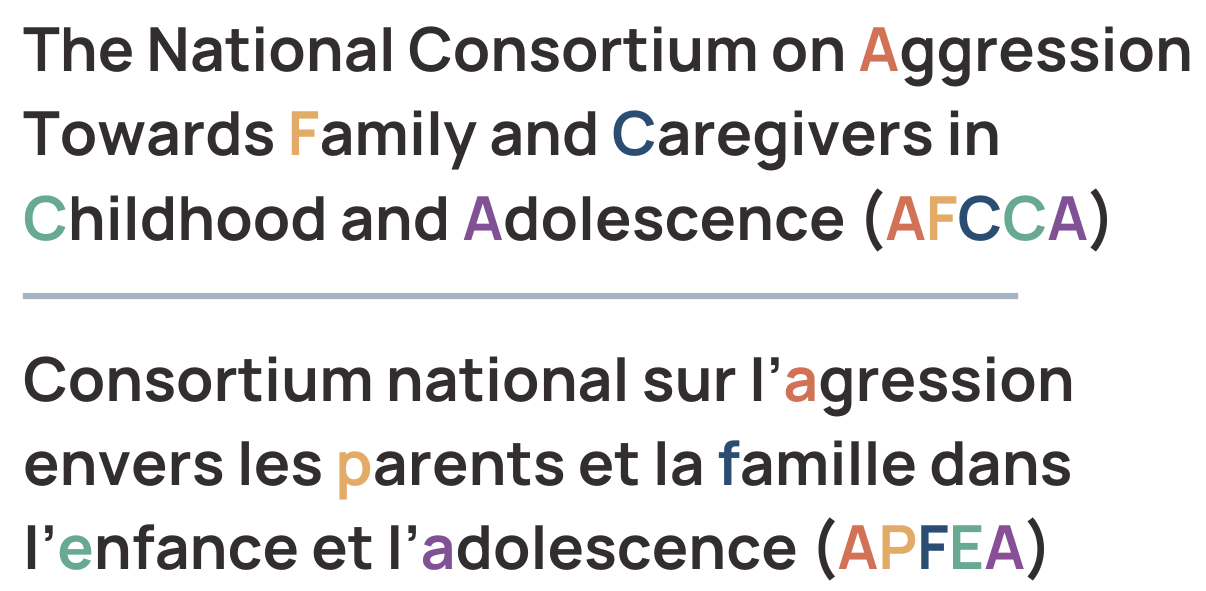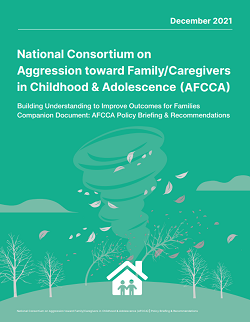2021 Report on AFCCA in Canada
In 2021, a national consultation was completed with parents, caregivers, young adults who experienced AFCCA, other family members, and supporting community members, seeking to understand their experiences. Across Canada, families came forward to share their stories, their ideas and suggestions, and to discuss what could help. The report “Building Understanding to Improve Outcomes for Families” is the summary of that work.
Meaningful family engagement was a core principle of the Consortium and over 100 family members with lived experience (including parents, caregivers, young adults who experienced AFCCA as a child/adolescent, siblings) were consulted. These first voice experts provided ongoing guidance to the Consortium through 1:1 interviews, multiple focus groups, qualitative discussions, and a series of online questionnaires.
Their insights create a shared sense of urgency in finding improved ways to support both the children and adolescents most directly impacted by this issue, and their parents and caregivers working so desperately to keep everyone in their family safe.
Families experiencing AFCCA reported living with an unexpectedly high level & frequency of aggressive behaviour in their home:
76%
55%
reported experiencing daily or weekly incidents of violence or aggression
considered the intensity of the behaviour at 8 out of 10 or higher
Youth and families experience AFCCA in complex ways, which can range in severity.
Respondents were presented descriptions of possible actions and asked if each was commonly represented within the child/adolescent’s behaviour in the home.
90% or more
Repeated angry / aggressive outbursts towards others
80%-90%
Psychological / emotional injury or harm to others
Destroying property
Aggressive language or swearing
Aggressive body language / posturing
60%-80%
Physical injury or harm to others
Threat of harm to others
Physical injury or harm to self
40% -60%
Psychological injury or harm to self
Dangerous / risky behaviour outside the home (ie. stealing, weapons, illegal drugs, etc.)
Parents/caregivers and young people are the most likely to be impacted by AFCCA.
Respondents were asked who the behaviour was most often directed toward, and they said*:
Respondents could choose multiple selections, based on their experiences (therefore numbers will not add to 100%).
Parent(s) or caregiver(s)
75%
Self-harm towards the youth themselves
72%
Sibling(s)
48%
Pets / animals in the home
15%
Other extended family
7%
Peers / friends
4%
All of the above
21%
-
Their experiences are invaluable to deeper understanding and possible strategies that will create actual change for youth.
-
For many youth, AFCCA can be viewed as a communication problem, where the child/ adolescent is struggling to communicate. Young adults with lived experience suggest that individuals who were supported in developing more effective communication skills or self-regulating skills had fewer incidents of aggression over time.
-
In the places where young people live, and with their teachers, their peers, their neighbors, their own self-defined family relationships.
This is not about professionals, clinicians, or practitioners - youth are seeking a true community who understands, the people directly in their lives to understand, and they want a sense of genuine belonging.
-
Particularly for youth with related neurodevelopmental disabilities, disrupted early attachments, adverse early childhood experiences, or developmental trauma.
Preparing parents/ caregivers to better understand and anticipate this behaviour may result in earlier skill building and more effective interventions before families reach a crisis.
Young adults with lived experiences want you to know:
Families have a broad view of desired successful outcomes
Parents/caregivers expressed a desire for 1 or more* of these outcomes as ones that would significantly improve conditions for their families:
88% or more
Improved self-regulation for child / adolescent
Reduction in violent, aggressive behaviours
70%-80%
Improved parent / child relationships
Creating healthier methods of communication
Improved sibling relationships
Enhanced safety for other caregivers in the home
60%-70%
Enhanced safety for other children in the home
Reduced risk of family disruption / separation
Enhanced safety for the child / adolescent themselves
50% -60%
Increased parent / caregiver understanding and capacity
Improved attachment with primary parent / caregiver
-
Families often do not seek help due to stigma, a lack of confidence that professionals have both the knowledge and willingness to help, and the fear of repercussions from child welfare and/ or justice systems.
This leads to further isolation and exacerbation of the situation, leaving families at greater risk of instability and breakdown.
-
AFCCA is present in a broad spectrum of families, including those with disrupted attachments and complex developmental trauma, developmental delays, neurodiversity, across adoptive and intact biological families.
-
They are raising urgent concerns about the safety of their child/ adolescent, other children in the home, and themselves. Experiences reported to the Consortium present an alarming picture of the immediate and ongoing risks to the physical and psychological safety for all family members.
-
Parents/ caregivers face repeated direction that the only way to access the necessary therapeutic interventions for their child is to relinquish custody to provincial child welfare agencies. Frequently a child's need for intensive therapeutic supports is responded to with the unnecessary use of the child welfare, child protection, or youth justice systems.
-
When they seek support for their families, parents/caregivers should be regarded as an expert in the individual needs of their children, and of their family.
-
Inequitable systems responses, where families from marginalized communities more frequently experience inadequate or biased response; lack of qualified/ skilled services and professionals; geographical isolation; gaps / lack of clarity in public policy for the support of children and youth with complex needs.
Parents & caregivers with lived experiences
want you to know:
download the reports
Building Understanding to Improve Outcomes for Families is the result of a national consultation with Canadian families, youth, researchers, and professionals in 2021. Read the full report for everything we’ve learned from those with lived experiences. The accompanying reports provide a proposed policy framework to improving systemic barriers, and an operational definition for practitioners supporting families.





